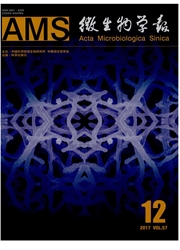

 中文摘要:
中文摘要:
家蝇抗菌肽多是碱性蛋白,目前尚无弱酸性家蝇抗菌肽的报道。通过稀醋酸低温浸提,海藻酸吸附,稀盐酸低温洗脱、盐析、SephadexG25凝胶过滤和CMC23弱阳离子交换柱层析等方法,利用灵敏的杀菌活性检测手段,从家蝇蛆(Musca domestica larvae)中分离纯化出一组弱酸性抗菌肽,对苏云金芽孢杆菌(Bacillus thuringiensis)等革兰氏阳性菌和几种革兰氏阴性菌有强烈的杀灭作用,有极强的耐热、耐冻融的特性。通过电洗脱方法进一步纯化出抗菌肽MD7095质谱测定其分子量7095Da,IEF电泳测得其等电点5.59,经肽质量指纹谱(PMF)鉴定为一新肽,扫描电镜超微结构观察表明,弱酸性家蝇蛆抗菌肽对苏云金芽孢杆菌的杀菌机制主要是使细胞膜穿孔,内容物外泄,最终使细菌完全解体死亡。
 英文摘要:
英文摘要:
Musca domestica, which belongs to insecta, diptera, cyclorrhapha, muscidae, is the most common muscae and the richest resource. It is very significant and valuable to isolate antibacterial peptides from Musca domestica and to develop these peptides into antibacterial medicine. Due to purify a pure peptide from the natural materials (animal, plant and microorganism tissue) is very difficult and complex, few research is going on. It had been reported that the most antibacterial peptides from Musca domestJca were alkaline, no weak-acid antibacterial peptides had been reported so far. Based on a high sensitivity detection method, using dilute acetic acid extraction, alginic acid absorption, NaCI salting-out, Sephadex G-25 gel filtration, CMC23 ion-exchange chromatography, electrophoresis, a group of weak-acid antibacterial peptides had been purified from Musca domestica larvae and partial characterized, The peptides had characters of broad antibacterial spectrum and low minimum bactericidal concentration against Gram-positive bacterium such as Bacillus thuringiensis, Bacillus subtilis, Staphylococcus aureus and Gram-negative bacterium such as Pseudomonas aeruginosa, Escherichia coll. The peptides were very stable to keep the antibacterial activity even kept in 95℃ for 120min and frozenthawed for 10 times, A weak-acid antibacterial peptide MDT7095 had been purified in high degree of purity by electro-elution, and was determined Mr 7095Da with MALDI-TOF-MS and pl 5.59 with IEF-PAGE, Peptide mass fingerprinting (PMF) analysis showed MDT7095 was a novel bioactive peptide. Few peptides with antibacterial activity against Bacillus thuringiensis had been reported, Observation by scanning electron microscopy (SEM), it was suggested that the bioactivity mechanism of antibacterial peptides from Musca domestica larvae against Bacillus thuringiensis was to perforate cell membrane and lead to bacterium lysis and die. It is hopeful to develop the antibacterial peptides from Musca domestica to candidate medicine.
 同期刊论文项目
同期刊论文项目
 同项目期刊论文
同项目期刊论文
 期刊信息
期刊信息
